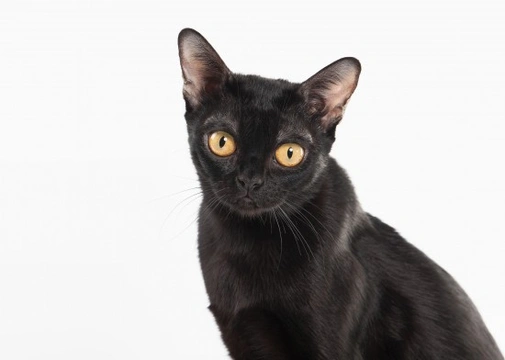
Some frequently asked questions about the Bombay cat breed
The Bombay cat is an affectionate, friendly shorthaired cat that was developed by crossing black coated American shorthair cats with the sable Burmese. This produces attractive, distinctive cats of the Burmese type, with short, sleek coats that are always black and glossy.
The term “Bombay cat” is usually used to refer to Asian cats with black coats, and being closely related to the Burmese, they share many of the typical Burmese traits in terms of size and appearance. They are entirely black in colour, including their nose and toes, and their eyes are yellow or amber. Bombay cats are muscular and of a medium size, weighing up to 10lb, with males tending to be larger than females.
They are very social, friendly with both people, other cats and sometimes dogs, and make for excellent pets for people who like highly affectionate cats that like to have lots of friends! If you are wondering if the Bombay cat is the right breed for you, in this article we will cover some of the most frequently asked questions about the Bombay cat breed. Read on to learn more.
What are their personalities like?
The temperament of the Bombay cat is affectionate and loving, and in fact, they are one of the few breeds where a kind temper is mentioned within the breed standard! They very much enjoy company, either of people or a companion cat, and will become unhappy if left alone for long periods of time. They do like to have a lot of attention, and while they are generally friendly with everyone who is kind to them, they tend to bond most strongly with their primary caregiver.
They are intelligent cats that remain playful throughout their lives, and as they get older, they tend to become more adventurous and more likely to enjoy going outside a lot and possibly hunting.
Do they require much grooming?
The Bombay cat’s coat is its most distinctive feature, being completely black, short and very glossy. This means that they do not require a significant degree of brushing and grooming, and are unlikely to get knotted or matted fur, or ever require bathing. However, some Bombay cats very much enjoy being groomed, and grooming them a couple of times per week will often provide a great bonding experience with the cat.
Are they good with children?
As a highly affectionate cat that is very playful and not prone to being shy, the Bombay cat is one of the best choices for families with children, although it is of course very important that younger children are taught the correct handling of the cat and how to play with them properly.
The Bombay will often bond strongly with kids and actively seek out their company, but they are also quick to retreat when they have had enough, which the children should learn to identify and respect.
Do they get on well with other animals?
The social, outgoing personality of the Bombay cat means that they tend to enjoy company of all types, and providing that they are properly introduced and socialised, will very much enjoy having another cat for company. Another cat can help to provide entertainment and friendship when the cat is left alone, but this should not be considered as an alternative to human company and companionship.
The Bombay is also a cat that is reputed to get on well with dogs that are cat-friendly, and so is also a good choice for multi-pet households with well-behaved dogs that know how to behave around a cat.
Do they need a lot of attention?
The Bombay cat does not require a significant amount of grooming or coat care, and they do not have any special requirements in terms of their handling or general management. However, they do require more attention than the average moggy, and will not be happy if they are left alone for large parts of the day while the family is out.
They can be fairly demanding and also relatively vocal, but providing that they have enough entertainment and company, are usually a good fit for families of all types.
Are they healthy?
The Bombay cat can live for over fifteen years when properly cared for, and they are not considered to be significantly prone to health problems and hereditary health conditions. However, certain health conditions that commonly affect cats of Burmese breeding and from Burmese breed lines can also affect the Bombay cat, including diabetes and hypokalaemia.
Certain Burmese breed lines will undergo genetic testing prior to breeding in order to identify the potential presence of some inherited health defects, and if identified, such cats should not be used for breeding. It is worth asking your Bombay breeder if any of their breed line have undergone genetic testing, or if there is an identified propensity to any known health conditions within the line prior to making a purchase.



